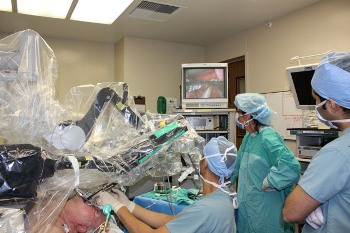Apr 18 2013
Researchers in London, Ontario, are conducting a first-ever clinical trial to determine which treatment option gives patients with throat cancers the best quality of life. These cancers are dramatically on the rise due to the epidemic of HPV (human papilloma virus) infection.
 Dr. Anthony Nichols performs robotic surgery on a throat cancer patient. With a Quality of Life grant from the Canadian Cancer Society, he will study if this non-invasive approach reduces side effects. (CNW Group/Canadian Cancer Society (National Office))
Dr. Anthony Nichols performs robotic surgery on a throat cancer patient. With a Quality of Life grant from the Canadian Cancer Society, he will study if this non-invasive approach reduces side effects. (CNW Group/Canadian Cancer Society (National Office))
Surgeon Dr Anthony Nichols and radiation oncologist Dr David Palma at the Lawson Research Centre have received a $223,000 Quality of Life Grant from the Canadian Cancer Society to conduct the study. Dr Nichols is an assistant professor in head and neck surgery at Western University. Dr Palma is a clinician-scientist with the Ontario Institute for Cancer Research.
The current standard treatment for throat cancers is radiation and chemotherapy, which results in good control of the disease but can leave patients with a variety of life-changing side effects, such as problems with speaking, swallowing, tasting and hearing and even feeding tube dependence.
A minimally invasive robotic surgery has emerged as a promising alternative treatment that appears to have fewer side effects.
"Patients with HPV-related throat cancers tend to be younger and healthier and have a good chance of being cured. As they will have to live with the side effects of treatment for decades, post-treatment quality of life is of paramount importance," says Dr Nichols.
"Before we can adopt a new treatment, we have to prove that the rates of cure are as good as they are with the standard treatment, which is chemotherapy with radiation," says Dr. Palma. "Sometimes new technologies are introduced with a lot of hype but don't prove to be helpful in the end. Transoral robotic surgery has shown tremendous promise as a treatment option, and we are the only ones in the world doing this type of study right now."
For the 3-year study, patients with early stage cancer of the oropharynx (which includes the tongue, soft palate, side and back walls of the throat, and tonsils) are invited to participate in a randomized phase II clinical trial. Patients will be assigned to receive either the current standard treatment (radiation, plus or minus chemotherapy) or the robotic surgery. One year after treatment, patient quality of life will be assessed for side effects.
This will be the first clinical trial to directly compare the 2 treatment methods and has the potential to have an international impact on the treatment of patients with throat cancers. In the United States, the robotic surgery is already being used for these types of cancers despite the lack of high-level evidence to support it.
To do the surgery, doctors use tiny robotically controlled surgical implements to remove tumours of the tongue, tonsils, palate or throat. The robot has a viewfinder and 3-D camera that can see around corners, and the tiny robotic arms can get into tight spaces where the surgeon's hands cannot fit. While the surgeon watches what's happening on a screen, the robotic arms precisely mimic the movements of the surgeon's hands and can even filter out the surgeon's hand tremor.
"The Canadian Cancer Society knows how important a patient's quality of life is during and after cancer treatment," says Dr Siân Bevan, Director of Research at the Canadian Cancer Society. "This exciting new surgical method shows great promise to vastly improve quality of life, and we are happy to be able to fund this important study, with the generous support of our donors."